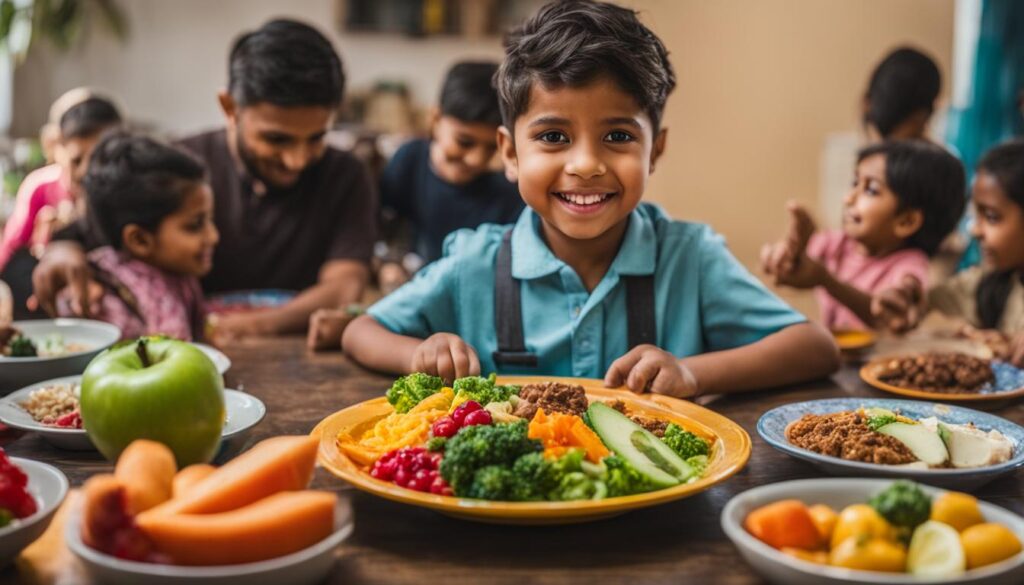Ramadan is observed by Muslims worldwide as a month of fasting, prayer, and abstaining from impure things. Ramadan is a religious duty for Muslim adults, with fasting from dawn to sunset being a mandatory act of faith. However, children are not obliged to fast until they reach a certain age, usually around 11 or 12 years old. From an early age, children are encouraged to participate in the celebratory meals during Ramadan and observe the fasting of adults around them. This helps them learn self-control and introduces them to the practice of fasting in Islam. The age at which children start fasting may vary depending on cultural and familial practices, but it is generally around the age of 7 or 8.
Key Takeaways:
- Children are not obligated to fast until they reach a certain age, usually around 11 or 12 years old.
- From an early age, children are encouraged to participate in the celebratory meals during Ramadan and observe the fasting of adults around them.
- The age at which children start fasting may vary depending on cultural and familial practices, but it is generally around the age of 7 or 8.
- Starting from around the age of 7 or 8, children can gradually learn about fasting, participate in celebratory meals, and practice self-control.
- Parents and guardians play a crucial role in supporting and guiding young fasting children.
The Importance of Fasting in Islam
Fasting holds great significance in the Islamic faith and is considered one of the Five Pillars of Islam, which are the core principles that guide religious obligations and practices. It is a time when Muslims abstain from food, drink, and other physical needs from sunrise to sunset during the holy month of Ramadan. However, the importance of fasting in Islam extends beyond the physical act of abstaining.
From a spiritual perspective, fasting is seen as a way to purify the mind and body, to develop self-discipline, and to deepen one’s relationship with Allah. It is a time for reflection and contemplation, allowing Muslims to detach from worldly distractions and focus on their faith. By denying oneself immediate gratification, fasting reinforces the principles of self-control and restraint, which are essential in leading a righteous and honorable life according to Islamic teachings.
Additionally, fasting during Ramadan helps foster empathy and gratitude. Muslims fast not only to fulfill their religious obligations but also to empathize with those who are less fortunate and experience hunger on a daily basis. It reminds individuals of the blessings they have been given and encourages acts of charity and compassion towards others. Through the act of fasting, Muslims are challenged to be mindful of their actions and to strive for spiritual growth.
The Spiritual Significance of Fasting
The spiritual significance of fasting in Islam cannot be overstated. It is a time of increased devotion, prayer, and seeking closeness to Allah. By abstaining from worldly pleasures, Muslims are reminded of the greater purpose in life and the need to prioritize their faith. Fasting also serves as a reminder of the transient nature of this world and the importance of focusing on the eternal realm.
Overall, fasting serves as a powerful tool for spiritual growth, self-reflection, and strengthening one’s connection with Allah. It is a time of deep devotion and dedication to the principles and teachings of Islam, fostering a sense of gratitude, empathy, and self-discipline. Through fasting, Muslims not only fulfill their religious obligations but also strive to become better individuals and strengthen their faith.
The Age for Starting Fasting
When it comes to fasting in Islam, there is no specific age mentioned in Islamic teachings for children to start fasting. However, it is generally recommended that children begin practicing prayer and fasting around the age of 7 or 8. This age allows children to gradually learn and grow in their understanding of their faith as they observe adults around them fasting during Ramadan.
It is important to note that children are not obligated to fast until they reach puberty. However, many children express a desire to participate in fasting earlier due to their curiosity and the sense of unity they feel with their families and communities. Parents and guardians should assess whether their child is physically and emotionally ready for fasting and provide the necessary support and guidance throughout the process.
Teaching Children about Fasting
Teaching children about fasting is an essential part of their religious education. Parents can introduce the concept of fasting and its significance in Islam at an early age. They can explain that fasting is not just about abstaining from food and drink but also about self-discipline, patience, and spiritual growth. Parents can also encourage their children to participate in celebratory meals during Ramadan, which allows them to experience the communal aspect of fasting.
It is important to create a positive and supportive environment for children who are fasting. Parents should emphasize the intention behind fasting and the spiritual benefits it brings. It is also crucial to ensure that children have balanced and nutritious meals before and after fasting to support their physical well-being.

Parents may also need to communicate with teachers and coaches to ensure that fasting children’s needs are accommodated at school and during extracurricular activities. This can include adjusting meal times or allowing for breaks during physical activities. By involving the broader community in supporting young fasters, parents can create an inclusive environment that respects their religious practices.
Overall, supporting and guiding young fasters requires a combination of education, empathy, and flexibility. By providing the necessary support, parents can help children embrace the spiritual journey of fasting in Ramadan and instill in them values that will last a lifetime.
Conclusion
In conclusion, the age at which children start fasting in Islam is not set in stone. While they are not obligated to fast until they reach puberty, many children express an early desire to participate in fasting. Around the age of 7 or 8, parents can introduce the concept of fasting and gradually involve their children in the practice. This allows children to learn about self-control, empathy, and gratitude while developing a deeper connection with their faith.
Parents play a crucial role in supporting and guiding young fasters. It is important to consider the child’s physical and emotional well-being when determining their fasting schedule. Providing balanced and nutritious meals before and after fasting is essential to ensure their health. Creating a positive and supportive environment, both at home and in school, can help children feel encouraged and motivated throughout their fasting journey.
Ultimately, fasting in Islam is not just about abstaining from food and drink. It is a spiritual practice that fosters self-discipline, reflection, and a stronger relationship with Allah. By starting the fasting journey at a young age, children have the opportunity to cultivate these qualities and embrace the true essence of Ramadan. As parents and guardians, it is important to guide them with love, patience, and understanding, allowing them to grow into confident and faithful individuals.
FAQ
What is the age at which Muslim children start fasting?
Muslim children are not obligated to fast until they reach puberty. However, many children express a desire to participate in fasting earlier, usually around the age of 7 or 8.
Is there a specific age mentioned in Islamic teachings for children to start fasting?
No, there is no specific age mentioned in Islamic teachings. It is generally recommended that children begin practicing prayer and fasting around the age of 7 or 8, as a gradual process of learning and understanding their faith.
What is the purpose of children participating in celebratory meals during Ramadan?
Children are encouraged to participate in celebratory meals during Ramadan to familiarize themselves with the practice of fasting and observe the fasting of adults around them. This helps them learn self-control and introduces them to the spiritual practice of fasting in Islam.
How can parents support and guide young fasting children?
Parents can start by introducing the concept of fasting and its significance in Islam at an early age. They can encourage children to participate in celebratory meals during Ramadan and gradually expand their fasting experience. It is important to assess the child’s physical and emotional readiness for fasting and provide support and guidance throughout the process.
What should parents consider when determining their child’s fasting schedule?
Parents should consider their child’s physical and emotional well-being when determining their fasting schedule. It is important to ensure they have balanced and nutritious meals before and after fasting. Parents can also involve teachers and coaches in accommodating fasting children’s needs at school and extracurricular activities.

